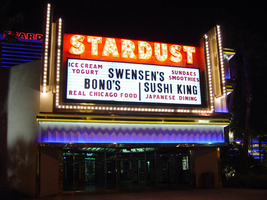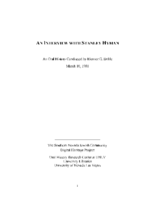Search the Special Collections and Archives Portal
Search Results

Genuine Auto Parts Neon Survey document, September 23, 2017
Date
Archival Collection
Description
Site address: 3738 Boulder Hwy
Sign owner: Carquest Auto parts/ Golden State Supply/ Cannon Property LLC
Sign details: This building was built in 2014 which replaced a different Auto Parts building which still carried Car Quest. This location sells self-installation car parts. The sign itself was for the Charleston Auto Parts, but was restored for the Genuine Auto Parts around 2012/13 for its 2014 installation.
Sign condition: 5- Still in pristine condition since recently restored
Sign form: Roadside pylon sign
Sign-specific description: This sign has a long black steel base. The main portion of the sign is a steel orange jelly bean shape that has a yellow arrow surrounding it and points towards the building. The yellow arrow has flashing incandescents. Below the arrow states "Genuine" painted on the board in white block letters with a thin black trim. Underneath the word Genuine is a painted black square that has white letters spelling out "AUTO" and "PARTS" underneath, both in white neon. In between these words is the start of the yellow arrow. Under the black box is painted "3738 Boulder HWY" in the painted white block font with a thin black trim. This sign stays true to its original design for the Charleston Auto Parts sign with the arrow and Auto Parts words, and the only thing changed was the word Charleston to Genuine and the address from Main Street to Boulder Hwy.
Sign - type of display: Neon and Incandescent
Sign - media: Steel
Sign - non-neon treatments: Incandescent light bulbs
Sign animation: Flashing incandescent light bulbs
Sign environment: This location is on Boulder HWY with an RV sales lot next door. The original sign was located between Main and Charleston.
Sign - date of installation: 2014 in this location - original sign was for Charleston Auto Parts, but was restored for the Genuine Auto Parts around 2012/13 for its 2014 installation. Original installation year would have been circa 1950's
Sign - date of redesign/move: 2014 restored and put in this location though if it is the Charleston Auto Parts sign restored then the sign itself would date back to the 50's
Sign - thematic influences: This sign is remnant of the old time auto shop sign particularly with the arrow to accommodate to the car consumer era of the 50's/60's.
Sign - artistic significance: Restoring the sign and putting it back up for a similar purpose stays true to Vegas history by having the Neon live on.
Survey - research locations: Asessor's Page, Recapturist Website http://www.recapturist.com/portfolio/charleston-auto-parts/, Roadside Architecture website http://www.roadarch.com/signs/nvvegas2.html , Car Quest Auto Website https://www.carquest.com/stores/nv/las-vegas/14980
Survey - research notes: http://www.recapturist.com/portfolio/charleston-auto-parts/ shows this sign in its original form for the Charleston Auto Parts, but was restored for the Genuine Auto Parts around 2012/13 for its 2014 installation.
Surveyor: Emily Fellmer
Survey - date completed: 2017-09-23
Sign keywords: Neon; Incandescent; Steel; Flashing; Roadside; Pole sign; Directional
Text

Inspire Theater Neon Survey document, August 18, 2017
Date
Archival Collection
Description
Site address: 107 S Las Vegas Blvd
Sign owner: Fremont LV Blvd LLC
Sign details: The original construction year of the building dates back to 1952. Though in 2013 the building was redesigned to open as the Inspire theater in 2014. The Inspire Theater offers a variety of venues including a 150 seated theater, a rooftop patio and multiple cocktail bars.
Sign condition: 5 - new sign with good quality day and night
Sign form: Blade and semi-decorated shed
Sign-specific description: The sign itself is all connected though it wraps around the whole building, it starts with a long rectangular blade with their logo then goes in a rectangle around the building and ends with their logo on a shorter blade with their logo. The longer white rectangular blade portion begins on the corner of the building above their rooftop lounge (which meets together back to back with a smaller rectangular blade). If you are going north on Las Vegas Blvd you will see the big blade which reads "INSPIRE" in channeled silver thin print font letters. The adjacent blade is a bit shorter, so you can see a portion of the big blade over the smaller one if you are looking at the building from the East Fremont District, with this overlay it looks like there is a letter "I" and a dash(-) underneath it. On the actual portion of the shorter blade there are the "INSPIRE" thin channeled font letters, which are identical in design to the other side of the sign but just a smaller font. The outside edges of these back-back signs are horizontally lined with neon tubing. These blades then continue around the building into two horizontally neon lined strips that make the building have a decorated shed feature to it. This then makes a rectangular feature around the whole building. In between the top of the rectangle and the bottom, there is a balcony where guests can hang out. Though on both the left and the right sides of the blade there are plasma screens that show advertisements for their property. Also on the west side of the building there are thin horizontal strips of LED/plasma lights that sparkle in an iridescent fashion.
Sign - type of display: Neon
Sign - media: Steel
Sign - non-neon treatments: T.V. screens, LED
Sign animation: Flasher and iridescent light flow
Sign environment: On the corner of South Las Vegas Blvd. and Fremont St. East, the first property on the south side of the Fremont St East District.
Sign - date of installation: 2014
Sign - thematic influences: The sign is incorporated into the architecture, as well as the sign wraps around the entire building which is remnant of the decorated shed look. The sign is related to the theater theme since the blade style sign was very prominent for the 1950's and 60's movie theater signs, such as the El Portal movie theater sign.
Sign - artistic significance: Their sign is very remnant of a 1950's Movie theater sign with the blade and wrap around of Neon, since they are a modern day theater it seems as if it's a retro throwback.
Survey - research locations: Inspire website, assessor's website
Surveyor: Emily Fellmer
Survey - date completed: 2017-08-18
Sign keywords: Blade; Neon; Steel; LED; Flashing; Video screen
Text

Kings Row Trailer Park Neon Survey document, September 14, 2017
Date
Archival Collection
Description
Site address: 3660 Boulder Hwy
Sign owner: Kings Row Trlr Pk Inc
Sign details: This property is still functioning as a mobile home park along Boulder Highway. They are one of the largest RV parks in Southern Nevada and within a close distance to downtown and Boulder Station Casino. They advertise that they have some of the best deals in town as well as about 200 spaces available. They have been operating in Las Vegas for more than 60 years.
Sign condition: 5 - in great condition, well maintained
Sign form: Roadside pole with a message center and directional elements
Sign-specific description: This sign is made up of many different small cabinets. The top is a painted crown that is plastic and backlit. This sits on top of a red minimal arrow sign that points to the direction of the trailer park. This sign has yellow incandescent light bulbs lining the edge with "Kings Row" painted in white paint on the top of the sign, "Trailer Park" painted in bold yellow text in the center, and the text is outlined with neon tubes. The cabinet under this is a long, red trapezoid with "OVERNITES" painted on it in bold white text that is also outlined with neon tubes. Under this is what appears to be an iron flourish on top of another plastic backlit sign. This sign as "RV SPACES" painted on it in bold red text over yellow paint, "INDOOR HOMES TRAILERS CAMPING" in bold red text against a white background, and "MOBILE HOME SPACES POOL REC HALL" in bold red text against a yellow background. Under this is another iron flourish. Following that sign is a plastic backlit reader board. Under that is a plastic backlit sign with "CAMPERS" in white text and underlined against a red background. Finally, there is another plastic sign in the shape of an arrow with "Kings Row" in a light blue script, "ENTRANCE " in red, and "TRAILER PARK" in black inscribed on it.
Sign - type of display: Neon, incandescent, backlit
Sign - media: Steel and Plastic
Sign - non-neon treatments: Paint
Sign environment: This property sits along Boulder High way and near many other RV rental businesses. It is also down the street from Boulder Station Hotel & Casino.
Sign - date of installation: Possibly c. 1962
Sign - date of redesign/move: Current sign not the original, which was a long rectangular shape cabinet
Sign - thematic influences: This sign is very unique to the RV park. To emphasize the "Kings Row" theme, the crown perched on the top of the sign is designed to help with this. Much of this sign is used to tell motorists and pedestrians what the property has.
Sign - artistic significance: This sign is elaborate. There are many different elements to this sign overall. This sign is that there is a crown to signify the royal theme of this property, possibly as a way to differentiate from other RV park signs around town.
Survey - research locations: Kings Row website, assessor's website
Surveyor: Lauren Vaccaro
Survey - date completed: 2017-09-14
Sign keywords: Neon; Incandescent; Backlit; Steel; Plastic; Paint; Pole sign; Roadside; Directional; Reader board
Text

Vegas Trailer Supply Neon Survey document, September 10, 2017
Date
Archival Collection
Description
Site address: 3076 Fremont St
Sign details: There is no information regarding the history of this property. According to their business page on Yelp, the business has closed.
Sign condition: 4, the sign is in good condition though it is not confirmed it the sign is still in working condition.
Sign form: Roadside pole sign
Sign-specific description: This sign is unique because there are two different signs featured for this property. One of the signs is supported by a large white pole. The top portion of this sign is a faded blue oval with "Vegas" painted on it in white script. Under this is a plastic, back lit sign with the word "TRAILER" in a white, western-style text against a red background. Under this is another sign that reads "SUPPLY" in the same style as the "TRAILER" sign. Beneath this is another back lit plastic sign that has an interesting graphic with the words "custom truck" filling it in red text and the "T" in "custom" is also the "T" in "truck." Under "custom truck" are the words "truck accessories" written in an artful cursive text and the words "and More!" printed in a plain sans serif text. The other sign for this property stands under this one and has five different poles supporting it. It also is placed between a blue pole and the white pole that holds up the other sign. This sign is very stylistic. This includes large red arrow that is outlined with red neon tubes and is sandwiched between a blue, rectangular sign that reads "VEGAS" along the side of it in bold white letters and "TRAILER SUPPLY "in open cabinet yellow letters in the center. The "Vegas" letters are outlined with neon tubes that glow light blue when lit up. Under this is a plastic, back lit rectangular sign that reads "PROPANE" in bold blue text against a blue background.
Sign - type of display: Neon and Plastic back lit sign
Sign - media: Steel and Plastic
Sign - non-neon treatments: Plastic back lit portion
Sign environment: This property was on East Fremont Street in an area that was filled with other business that would service or sell cars.
Sign - thematic influences: These signs combined have many different styles going on in them. The first sign has a western style of font possibly evoking a western theme that has been popular throughout many properties in Las Vegas as a throwback to our past as a small western town. The other sign, that is smaller in comparison to the other, is reminiscent of the Googie style signs that were prevalent in the 1950's because of the stylistic red arrow that is featured on it.
Sign - artistic significance: There are so many styles featured in these signs combined. This sign is an excellent study in how signs for the same property can include a mixed variety of design styles.
Survey - research locations: Yelp website https://www.yelp.com/biz/vegas-trailer-supply-las-vegas , Classic Las Vegas website http://classiclasvegas.squarespace.com/classic-las-vegas-blog/2015/5/25/neon.html , Las Vegas 360 website http://www.lasvegas360.com/1787/daily-neon-vegas-trailer-supply-neon-sign/
Survey - research notes: It was very difficult to find information regarding the history of this property.
Surveyor: Lauren Vaccaro
Survey - date completed: 2017-09-10
Sign keywords: Neon; Plastic; Steel; Backlit; Roadside; Pole sign
Text

Photographs of Stardust signs, Las Vegas (Nev.), 2002
Date
Archival Collection
Description
Site name: Stardust Resort and Casino
Site address: 3000 S Las Vegas Blvd
Sign owner: Boyd Gaming
Sign details: This is a large casino property that is clearly a center of attention.
Sign condition: Structure 4 Surface 4 Lighting 4
Sign form: Pylon; Fascia; Porte-cochère
Sign-specific description: Even though the facade of the Stardust has gone through many changes, streamlining itself over the years, yet retains aspects of it's original flavor. The tower faces northwest and southeast and is adorned with horizontal bars of red neon underlining each floor. The top tube only stretches approximately one-quarter of the way across the face, and with each floor, the neon gets increasingly longer. The result is the building being cut across the face at an angle, with one half being illuminated by the red neon and the other by ambiently blue lighting. Large Channel letters spelling "Stardust," are bordered by red neon and filled with incandescent bulbs. The Majority of the external signage is on the low rise structure close to the street, with the tower located to the northwest behind it. The array is comprised of two small pylon message centers, a porte cochere, the main pylon, and assorted entrance signs. On the south side of the building alongside a large parking lot, an entrance sign hangs above a two-sided corner entrance, Wrapping this small corner, polished gold raceways and trim create borders for the accordion surfaced pediment, and shoot up vertically into the sky on the far ends. Blue neon shines from behind the shining trim above the door to illuminate the whit accordion facade. The trim above that is adorned with two tubes of gold neon on the top and the bottom, hidden in recessed channels to cast a gold halo from behind. The two vertical edges are lined with incandescent bulbs. On the south wall of the small corner, channel letters stand on the top edge of the golden molding, reading "Casino." They are black on the exterior, painted white on the interior, and filled with incandescent bulbs, and bordered with red neon. On the Southeast edge of the building another entrance of a bit more design Above a set of doors, and the blue lit accordion facade and golden halo cast metallic trim, a Squared "U" shape made of polished metal raceways, holds a back lit message center housed on a black cabinet. On either side of the vertical legs of the "U" shape, another single raceway rises slightly higher in the air. All the raceways are lined with incandescent bulbs. Above the cabinet, black channel letters, spell "Stardust." They are finished white on the exterior, filled with incandescent bulbs, and outlined in red neon. Moving around to the eastern facade of the building, the facade is a three leveled pediment in the accordion pattern, and separated with the polished trim. The Yellow and blue lighting illuminate this facade also. The pattern is only interrupted by oval shaped back lit cabinets, placed every so often. Eventually you come to the porte. It is no longer finished with mirrors, but still retains the raceways lined with incandescent bulbs. The surface in between is filled with white stucco finish. What is left is a series of 5 hexagonal shapes crafted out of raceways and hung a section ceiling lower than the rest. Geometric patterns radiate from this center piece. North, past the porte cochere a section of building juts out to the east. It contains an entrance on the north and south faces, and two on the east face which are parts wrapping around from the previously mentioned entrances. Over the north and south entrances the "U" shaped polished metallic raceways and external flanking raceways, as seen before on the southeast entrance, play host to a narrow LED message center and channel text spelling stardust. The letters have the same treatment as the previous sign as well, and spell "Stardust" in channel letters. They too are filled with incandescent bulbs and bordered with red neon. Above the text, channel pans are in the shape of four pointed stars as seen on the main pylon, are slightly scattered as if to be showering over the text. They are multi colored, centered with arrays of incandescent bulbs and interior neon contours. The accordion facade and lighting are below the composition. Below the accordion pediment, a polished gold bullnose creates a pediment above the door and wraps around to the east face of the structure. A pointed end polished metallic cabinet is placed in the section of the bullnose over the door, spelling "Casino Entrance" in channel letters and filled with red neon. The surface of the bullnose is laden with incandescent bulbs. The facade wraps around the front with another pointed end cabinet reading entrance in the same fashion as the previously mentioned text. A small section of foliage and shrubbery line the west face of this extension of the casino before the same arrangements of sign are seen repeated on the north face. Passing the entrance the property opens up into a courtyard with an arrangement of low rising concrete cylindrical fountains created a multi-leveled garden of spurting water and plants. Just past the courtyard another entrance is found created out of the northeast corner of the building. Like the other entrances, elements such as the blue lit accordion face, double rows of vertical metallic raceways, properly treated channel letters, are present. The gold raceways wrap the corner with backlit cabinets on the east and north faces. The channel letters read "Stardust" on the east face and "Casino" on the northern face. The ceiling that the overhang creates is finished in polished metallic material and laden with incandescent bulbs. Just outside the last entrance the first of two low rise message pylons. The one located on the north end of the property is larger and more spectacular. The large triangular cabinet's faces are backlit, slightly concave message boards. The tops of each o these cabinets in adorned with a smaller, purple steel cabinet, approximately eighteen inches tall, and running the length of the cabinet. "Stardust is spelled across the length of the cabinet in channel letters, and filed with rose neon. The cabinet is laden with incandescent bulbs, creating a canvass for the letters to reside. The three edges, which is the gap where the three signs meet and the bottom of the cabinet are covered in incandescent bulbs. The surfaces are treated with polished metal. The pole which the cabinet sits is a white, two sided, support with two peaks growing out horizontally about two-thirds up the height. The shape, along with a Stardust style star channel pan in its center, is a representation of the repeated image associated with the logo of the property. The edge of the post is treated with a border of purple paint and lined with purple incandescent bulbs. Just inside the border stripe a channel recesses forming another border for a tube of purple neon. The star pan channel in the center is bordered in teal neon and filled with incandescent bulbs. A top the entire cabinet is an array of stardust stars of various colors, bordered in neon, and or filled incandescent bulbs. The array is assorted again to appear as if they are being showered, tapering to one single star at the top. The entire cabinet rotates slowly from right to left. The cousin to this sign is at the extreme south end of the property, set before an entrance give a larger double backed cabinet sits off center on a square post. The white plastic face is housed in a white steel cabinet with rounded edges. The top or the sign is comprised of the same purple cabinet and channel letters seen in tops of the concave message boards of the rotating relative at the north end. The width of the cabinet is strewn with incandescent bulbs, continuing underneath as well. The post is painted two tones.
Sign - type of display: Neon; Incandescent; Backlit
Sign - media: Steel
Sign - non-neon treatments: Graphics; Paint
Sign animation: Chasing, flashing, oscillating
Notes: The incandescent bulbs inside the text reading "Paris" on the balloon oscillate rapidly.
Sign environment: To the south of the Stardust is the Westward Ho, and to the North is Circus Circus. It stands with these two as well as the Frontier as vestiges of an older era of Las Vegas resorts. The Riviera also resides across the street. Vast shoots of concrete, spread out in front of the hotel, creating a continual plaza which runs from north to south. It contains lush flowers and fountains that toss water to each other is shooting arcs. In the daytime, the white of the remodeled facade is almost blinding against the concrete.
Sign manufacturer: Ad-Art (pylon); Sign Systems, Inc (porte cochere)
Sign designer: Paul Miller (pylon) Brian K. Leming ( porte cochere and facade)
Sign - date of installation: 1968
Sign - date of redesign/move: The original Electra-Jag style letters were replaced in 1991 by a sleeker Helvetica type face, as well as the letters for Enter the Night being changed to read "The Wayne Newton Theatre" in 1999. Also in this year, the facade was changed to a reserved white finish. The accordion shape is still present but no longer tri colored. The move was presumably made in an attempt to compete and fit in with its bigger corporate competitors.
Sign - thematic influences: The Stardust's theme revolves around an outer space/science-fiction theme, which was exceptionally popular during the era which it was created. When the original design, no longer present, was created in 1958, the Russian space project of Sputnik was just realized.
Sign - artistic significance: This is one of the most widely-admired and imitated signs on all the Strip.
Surveyor: Joshua Cannaday
Survey - date completed: 2002
Sign keywords: Chasing; Flashing; Oscillating; Pylon; Fascia; Porte-cochère; Neon; Incandescent; Backlit; Steel; Paint; Graphics
Mixed Content

Transcript of interview with Brad Friedmutter by David G. Schwartz, September 12, 2016
Date
Archival Collection
Description
Brad Friedmutter is the architect behind a number of Steve Wynn’s prominent casinos in Las Vegas, Nevada and Atlantic City, New Jersey. He obtained his degree in architecture in 1973 from the Cooper Union School of Architecture in lower Manhattan and worked on a number of smaller projects before connecting with Steve Wynn. After meeting the famous Vegas tycoon, Friedmutter built a number of well-known casinos, like the Golden Nugget and the Mirage. In this interview, he discusses the development of his numerous projects, explains his process for starting and completing architectural projects, and the future of urban planning and casino design.
Text

Transcript of interview with Stanley Hyman by Eleanor Doble, March 10, 1981
Date
Archival Collection
Description
Interview with Stanley Hyman by Eleanor Doble on March 10, 1981. In this interview, Hyman discusses his job as a district manager for Farmers Insurance group, which brought him to Reno, Nevada in the 1940s, then to Las Vegas in 1951. He talks about the population growth of Las Vegas, and comments that the infrastructure of the city did not improve with the population growth. He also talks about some local disasters, the economy, entertainment, and the convention business in the area. He speaks briefly about recreation at Lake Mead and Mount Charleston, and atomic tests. The interviewer asks about women in leadership positions in hotels and in the insurance business.
Text

Transcript of interview with Lawrence Hawley by Andy Sturgeon, March 13, 1981
Date
Archival Collection
Description
On March 13, 1981, Andy Sturgeon interviewed attorney Lawrence Hawley in his office on 302 East Carson Street, Las Vegas, Nevada. The two discuss how Hawley first came to Nevada, as well as his personal family history. Hawley describes Hoover Dam as it was being built, the effects of the Depression on Nevada, and how Las Vegas has grown in size. Hawley also discusses liquor laws and how practicing law has changed since he first moved to Nevada.
Text

Transcript of interview with Don Hayden by Steven Cohen, March 1, 1979
Date
Description
On March 1, 1979, collector Steven Cohen interviewed school administrator, Don Hayden (born in Ogden, Utah) in his home in Las Vegas, Nevada. This interview offers a historical overview of the education system in Nevada. Don also discusses gambling, the early atomic tests, the first hospitals built in Las Vegas, and offers his own personal account on home and family life in Nevada.
Text

Transcript of interview with Elbert Edwards by Layne Covington, October 16, 1986
Date
Archival Collection
Description
On October 16, 1986, Layne Covington interviewed Elbert Edwards (born 1907 in Panaca, Nevada) about his life in Southern Nevada. Edwards first talks about his family background before talking about what it was like to live in Panaca. He then talks about changes in Southern Nevada, particularly those in Boulder City that have taken place over time. Edwards later talks about the work of his wife and both of their political involvement and his involvement and career in education. The latter part of the interview includes discussion of the building of Boulder Dam, Edwards’ job as a registrar in the Selective Service, and the effects that the war years had on Las Vegas.
Text
